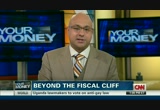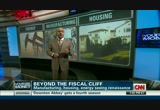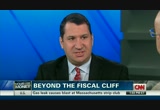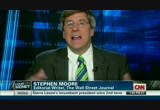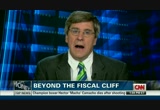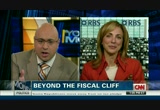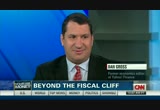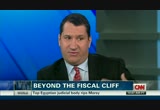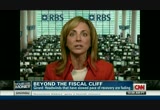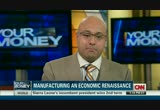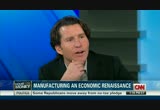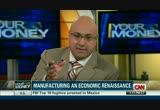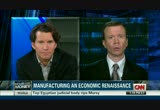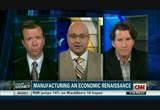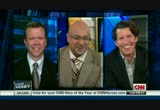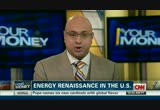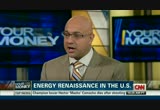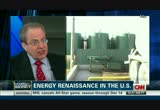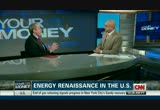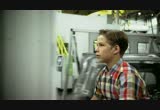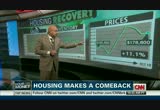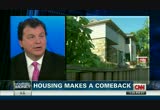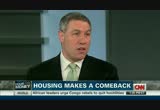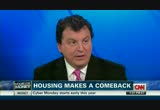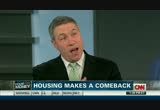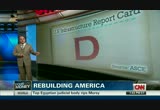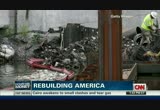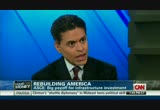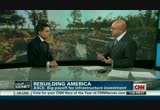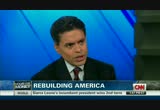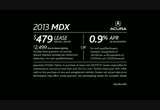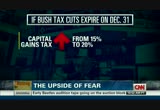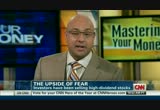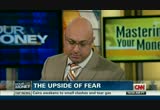tv Your Money CNN November 24, 2012 10:00am-11:00am PST
10:00 am
french court. last august high levels of radioactive chemicals were found on his clothing sparking the murder investigation. coming up in the cnn newsroom, u.s. congress returning on tuesday with all eyes focused on the fiscal cliff. and black friday has come and gone and now the best barringians are 48 hours away, perhaps, on cyber monday. we'll have tips you need in order to try and save some cash this holiday season. "your money" starts right now. for months i wornd you about the economic storm of the dangers of going over the so-called fiscal cliff. the one washington created. it seems with the noise of the campaign behind us, washington is listening which means that after several months of harping on the dangers that you face, i'm ready to make a big switch to telling you about the
10:01 am
opportunities that lie ahead. i'm ali velshi and this is "your money." i will not drop this issue until it is settled. then we have the debt ceiling debate. but there is life after washington induced catastrophe. frankly, it looks like a pretty good life. if all goes according to plan, 2013 could be a big turn around year for the u.s. the start of a recovery that feels real. most of it will have very little to do with washington policy though your state and federal government will have to step in to make it happen. let me explain. first, there's an energy boom under way in the united states right now. fueled by hydraulic fracturing and by more drilling for oil. natural gas is currently cheap, abundant and increasingly used not just as a fuel source direct to home and businesses, but as a source for electricity generation.
10:02 am
as for oil, you don't need me to explain the value of producing it. it's not about cars and homes, more domestically produced energy will help fuel a resurgence in u.s. manufactured goods, combined cheap and abundant electricity with costs in china and other countries and shipping costs and you make made in america more attractive to americans and to buyers abroad and that's good for u.s. jobs. finally, housing is already making a comeback. it started to turn around in 2012 with existing home sales rising for the first time in years. construction is starting to pick up. historically low interest rates averaging below 4% for a 30-year fixed mortgage will fuel a rebound next year. a house will be the most important asset for most americans. a rebound there makes americans feel better about their financial situation and ready to spend a bit of money. stephen moore is a senior economics writer at the "wall street journal" as well as a member of the editorial board.
10:03 am
michelle girard is senior u.s. economist at rbs and daniel gross is a columnist and business editor at "newsweek" daily beast. daniel, my thees sis thsis is t washington is likely to avert a fiscal cliff, unleash the animal spirits. we have things going on that are going to lead to an american economic renaissance starting right about now. am i wrong? >> well, i don't share your optimism about us not going over the fiscal cliff. but i also don't think it will matter. what we've seen in the past couple years, the recovery we've seen has been in spite of government, not because of it. it's not just the factors that you cited, energy, manufacturing, housing finally coming back, housing starts up 40% in october year over year. our exports are at their highest level ever, even in this world that is growing more slowly. our goods and products have a big audience overseas. and the american consumer that was so down-and-out in '08 and '09 is back.
10:04 am
consumer confidence, highest level since prerecession. more people are working at payroll jobs. their incomes are rising. everybody is doing a much better job keeping up with financial obligations, credit cards, mortgages, et cetera. all that means this could be a pretty decent shopping season. >> stephen moore, you and i don't share views on everything. we share views on wanting america and the world to be prosperous. and we've been riding the same gloomy wagon for a little while. would you like to come and join me on the happy wagon? do you find my argument that a renaissance is a foot compelling? >> i love the theme of this american renaissance. there is nothing more i'd like to see. you are excellentry righ rr rrr right. there is so much right in america. but when it comes to the industries that you talked about, i'm right are with you. i love the american energy story. we can be the saudi arabia of oil and natural gas production. don't forget coal. we have hundreds of years of that. we can have -- by the way,
10:05 am
you're exactly right. because we now have that access to cheap and abundant energy in this country, that has real peripheral effects with respect to manufacturing. i lot of manufacturing story because our electricity and energy costs are now lower than the rest of the world. i agree with you on housing. we haven't built any housing in this country with five years. you can see a renaissance in housing continue. so you and i agree on those things. but i do think policy matters. it's not just solving the fiscal cliff in my opinion, it's solving it in the right way. >> who are you and what have you done with stephen more moore? >> michelle girard, any recovery? daniel he lead -- eluded to. this american consumes have been telling us for months that contrary to other economic evidence and indicators, things are looking and feeling better for them. guess what? they have never, ever been wrong. every time the american consumer says we're going down, we go
10:06 am
down. when they say things are getting better, they're getting better. they feel okay. >> and i think it gets back to just like you said, the housing turn around. i think that that's helped consumers to feel much better about their own financial positions and, of course, the fact that the he can quit market through the summer was doing, you know, we've seen a rebound, certainly not in the last month. but part of that. i mean these things coming together i think have certainly bolstered consumer confidence. although i will say in the end, so much of how the consumer will do is tied to jobs. and that's why you do get back to business. and that's what stephen said is so important, how do you resolve this fiscal cliff is incredibly important in terms of businesses knots only have uncertainty removed, but actually feeling like they'll be a better environment going forward. if that happens, then you can finally see more hiring and more investing and ultimately that's what gets the economy going at a rate that we haven't yet enjoyed so far in this recovery. >> so why? why then, dan, are we feeling
10:07 am
this way? you share the view that we are not -- you're not done with the fiscal cliff. we're not going to suddenly solve our fiscal problems. we certainly haven't been talking enough on the spending side. there seems to be movement toward the idea that some people's taxes will go up at the high end. middle class won't see much of a tax increase. why the optimism? are we justified? >> well, i think the typical consumer is not like you and me and our other guests here. the typical median income is $60,000 a year for a family. they're not getting a lot of money from capital gains and dividends. they're not freaked out at the prospect of those going up. they're concerned about what is in their paycheck. paychecks are morsteady than they had been any time the last few years. wages are going up a little bit. the biggest asset that anybody owns is a house. we finally seem -- it's not just the value of sales rising and construction but home values. and so with every passing week, you know, certain number of people underwater on their mortgages are now in positive
10:08 am
territory. and that contributes to what we call the wealth infeceffect. when things are going in the right direction, that forces to propel them further. >> stephen, again, you feel very rongly that tax rates should go down, certainly not go up. but these pro cyclical things, the idea that the price of your house could go up. you're stuck with a house and might be able to sell it. credit marginally becoming a little bit easier. jobs are coming there and ultimately yo lly you're more interested in the paycheck than the taxes you pay on the paycheck. let's say we see a little tax increase. does it outweigh it? i'm not asking you to give up your position. you're always here arguing your tax position. but does it outweigh your on going concerns that taxes are going to cripple us? >> yeah, i think we can grow through this despite the fact that i do think if we raise the taxes our growth rate won't be quite as high. i want to make two quick points on this. one is that i think michelle is right. it all starts with jobs.
10:09 am
because if people don't have jobs, they don't pay the mortgage. they can't buy houses. the second point i made is to stay on this optimistic theme, maybe because it's thanks giving weekend. but you know, i made this point before on your show. you know, it comes to america relative to the rest of the world, we're the least rotten apple in the house, right? and that gives us a huge advantage in terms of investment coming to the united states, building new businesses. and that's why i'm, you know, i'm somewhat optimistic that despite the fact that unlike the direction washington is headed. >> we're always the least rotten apple but had a worm in it. maybe this fiscal cliff discussion will remove the worm. michelle, what does washington have to do to not reinstall the worm into the apple, to not get in the way of this consumer -- this feeling that things are getting better? >> bottom line is that i do think that we are kind of talking about an economic that is going to be aabing if we can the right thing, to grow 2% f we can get some longer term
10:10 am
certainty in terms of a grand bargain and, again, release the constraints this economy and businesses face in terms of uncertainty, i think we can look at an economy that could grow better than trend for the first time in this recovery. >> i look forward it to. i just want to reach out and hug all of you. thank you. good discussion. this is thanksgiving, it's a useful time to point out a lot of the good things. we'll continue to do that as necessary, however. dan gross, great to see you. dan gross, global business editor for "newsweek." michelle girard, director of ubs and stephen moore is a writer with "the wall street journal." thank you. coming up, we just touched on it. globalization chipped away at u.s. manufacturing jobs over the last few decades. there are signs that some of the jobs are coming back. certainly manufacturing is. don't expect to wear overalls and a tool belt to the job site though. we'll look at the manufacturing jobs of the future when we come back. you're watching "your money."
10:13 am
10:14 am
lost. take a look at this. jobs in leisure and hospitality. one of the big growth areas. pay on average $13.35 an hour. retail, another area that we've been growing, $16.43 an hour. neither of these pay as well as manufacturing with an average hourly rate of $24 an hour. since january of 2010, the u.s. economy added 508,000 manufacturing jobs. that's since the beginning of the recession. that is a blip compared to the last 25 years. since 1987, take a look at this, the u.s. lost 5.5 million manufacturing jobs. but in the same time, america's manufacturing output has increased by 84%. we increased our output as we employed substantially fewer people. technology, automation. scott paul is the executive director of the alliance for american manufacturing, a research and advocacy group. will cane, conservative cnn
10:15 am
contributor. scott, we're producing more with less manufacturing looks promising in the u.s. as an industry. but do manufacturing jobs look good? >> well, that's the real question. i do think that there's a good future for manufacturing jobs in this country. no, we won't have factories that are employing 10,000, 20,000 people like we did in the '50s or '60s. there are lots of reasons to believe we should invest in manufacturing that we can actually add jobs on. and that it's a viable career path for young people today. we have an aging manufacturing workforce. second, energy costs and other costs of production are coming way down in the united states. you're seeing firms that are reshoring jobs. you're seeing lenovo open up a laptop manufacturing facility in north carolina. these are things you couldn't have imagined a decade ago. >> let me bring will into this conversation. president obama, as you know, during the campaign promised and
10:16 am
people say all sorts of things during campaigns he was going to create a million new manufacturing jobs. he also wants to tax the rate on manufacturers. he wants to lower the tax rate on manufacturers, provide incentives for companies that reshore or bring jobs back to the united states. and you say exactly the opposite of what scott just said. you say this is a policy that takes us back to the '50s. listen, everything -- president obama's list of things you just put up on the tv screen, that is the fly in the ointment. we have seen somewhat of a small manufacturing renaissance over the last decade. bravo. so why does manufacturing need special tax rates, incentives, tax subsidies, so forth? >> scott? >> there's a good answer for that. yes, it does deserve special treatment. first of all, there is no other sector of our economy that has a higher multiplier effect. when you create a job at a factory, you create spinoff jobs. the logistics, cash going to the
10:17 am
economy creates jobs. the opposite is hardly ever true. second, we now know that manufacturing production and innovation are linked together. when those two are separated by an ocean, it doesn't work very well. and that's what firms are discovering. in fact, some of the leading researchers at mit and harvard have included the same thing. if you actually want to have innovation in the economy that's going full freight, you need to have production. >> so let me ask you, scott -- >> and finally exports as well. >> we'll get to exports in a second. let me hold up an example. apple managed to innovate successfully and manufacturing everything an ocean away. >> apple is the jou liar. they have a rerisky manufacturing strategy depending on 250,000 workers in china that are working in deplorable conditions as we know. there's a smarter way to do it. and, yes, it would be highly automat automated. they could be employing thousands of engineers in california, making those
10:18 am
products. it wouldn't raise the cost of an iphone more than a couple of bucks. but the returns for our economy would be fabulous. >> here's the deal, scott. if those benefits are all exist as you lay them out, the innovation and manufacturing need to be geographically linked in order to fully be open timized, won't the companies realize that benefit? why do we need government to provide special benefits to realize that goal? if it's there, it will be self evident and the company will choose that path. >> well, am, that's a good quechlt here's the reason. manufacturing is in the tradable sector. we have global competition. hospitals don't. retailers don't. other sectors of the economy don't necessary sli that. manufacturers do. and every other country out there has incentives to attract manufacturing. whether it's the low road like china or the high road like germany f we're not in that game, we're going to be sitting on the sidelines and lose jobs. we've seen. that our manufacturing goods, trade deficit has gone up. >> that might be true that some
10:19 am
play dirty, with don't we as well snt risk becomes that we encourage mal investment. all the things that make the united states unique and special over the past 100-odd years in the economy and that's innovation. and that's resilience had to do little with subsidies. little with special treatment but rather equal playing field. let's not corrupt what is made special to play dirty to keep up with the dirty players. >> i'm not suggest we go play dirty. i disagree with your economic history a little bit. every successful industry that's been incubated in the united states has been subsidized like sems and you can go back to the telegraph and find. that i think we have a differing view of economic history. but what i'm suggesting is this, someone's going to make cars for consumers in the united states. i'd like to see them made here. japan, korea, china, germany, they all have manufacturing strategies. if we don't have one, and i think -- i don't think it should be a dirty one. i think it should be smart and sophisticated. i think it should be based on incentives and what the private
10:20 am
sector wants. but you can attract that manufacturing. it's why ford is bringing manufacturing of the fusion back to the united states. that's why gm is bringing back some of the r & d functions from india to michigan. that's why you've seen lenovo moving laptop manufacturing from china to north carolina. if you have the right kind of incentives, manufacturers will respond because there's an american manufacturers have a great workforce as you pointed out, will. we have great energy costs and we can successfully compete. >> until i get the 90-minute version of this show where we can discuss whether anybody anywhere in the world should be providing incentives for manufacturing or for anything else, i know what your response is going to be, nobody should do it. excellent discussion. i love having you on talking about this. i think we have to do this again. scott paul and will cane. >> i said when you take pictures of ali, make sure to note this is not colonel sanders.
10:21 am
it's tan, not white. >> good to see you as always, will. >> next, an energy boom. will eluded to this. is that bringing jobs back to the heartland in america? fracking is putting americans back to work even as environmental concerns grow. i'm going to squeeze some energy out of this topic right after we pay the bills. hi, i'm phil mickelson. i've been fortunate to win on golf's biggest stages. but when joint pain and stiffness from psoriatic arthritis hit, even the smallest things became difficult. i finally understood what serious joint pain is like. i talked to my rheumatologist and he prescribed enbrel.
10:22 am
enbrel can help relieve pain, stiffness, and stop joint damage. because enbrel, etanercept, suppresses your immune system, it may lower your ability to fight infections. serious, sometimes fatal events including infections, tuberculosis, lymphoma, other cancers, and nervous system and blood disorders have occurred. before starting enbrel, your doctor should test you for tuberculosis and discuss whether you've been to a region where certain fungal infections are common. don't start enbrel if you have an infection like the flu. tell your doctor if you're prone to infections, have cuts or sores, have had hepatitis b, have been treated for heart failure, or if, while on enbrel, you experience persistent fever, bruising, bleeding, or paleness. [ phil ] get back to the things that matter most. ask your rheumatologist if enbrel is right for you. [ doctor ] enbrel, the number one biolog medicine prescribed by rheumatologists.
10:24 am
for the first time, i'm seeing past the dangers of the fiscal cliff. things are looking up, particularly when you look at the energy sector in the united states. a new report from the international energy agency predicts the u.s. will become the world's largest oil producer by 2017. temporarily surpassing saudi arabia. the same report projects the u.s. will be nearly energy sufficient by 2030. these are loaded terms. you heard in the campaign talking about north american energy independence that, includes canada and mexico. but all of this business was
10:25 am
something that was unthinkable not too long ago. there is an oil shale boom in the united states, new drilling methods are driving the growth and creating jobs. 1.7 million jobs have been created. that number is expected to grow to 2.5 million jobs over the next three years. could reach 3.5 million jobs by 2035. it's unconventional oil and natural fwas production through a process called fracking. hydraulic fracturing is the full name. it vofsz pumping water, sand, and chemicals into the ground at high pressure to crack rocks open. there is gas in them rocks. it's a costly process. there are environmental concerns. some people even say they cause earthquakes. the chairman and chief investment of leeb capital management joins us. he is author of "the oil factor." let's get to the -- i don't want to ignore the environmental concerns. we'll get to. that first, i want to ask you this. according to the department of energy, they say between 2008
10:26 am
and 2011 crude oil production in this country jumped 14%. natural gas production climbed more than 10% in this country. tell me what you think of this. >> i think that's a good thing, ali. i would not get that excited. i'm thrilled. i didn't know that number about the number of jobs created. i think that's wonderful. but i hope this country has the sense to realize this is a temporary phenomenon. this is not anything resembling a long term answer to our energy problems. i mean one point i have to make is the same agency that is telling us we're going to surpass saudi arabia five or ten years ago was telling us that saudi arabia was going to produce 10 million barrels a day. they're a little sarcastic. >> you're other worry is that with more energy production, there's a disincentive to use energy properly.
10:27 am
>> this so true. and what you're seeing now is no one is making money fracking. i mean you may see profits on the bottom line. >> but natural gas prices plummeted? >> natural gas prices plum itted. even in the oil area which is very interesting in the shale formation. you have the biggest player continental resources producing great earnings. but once you subtract out how many rigs and the cost of those rigs, guess what? negative, negative cash. they have to continue to borrow. the depletion rates on these wells are so great. so it's basically a short term fix. i mean definitely i think oil production will continue to go up maybe for another year. maybe for two years. i don't think the iea will be right. but it will allow us to buy time, to really develop other kinds of energy sources. i really, you know, i'm not a green guy or anything else. i'm a resource scarce guy. i mean there is just not that much of it.
10:28 am
>> it makes you see green. but you want it for the same reasons. you want to say let's have resources for energy production that are renewable and always going to be there. >> right. i give somebody the argument that we don't understand what's going on with the environment. they could be the sun. it could be the hydro -- i give them that argument. the argument i won't concede is that resources are get ever scarce. and that we have abundant sun, abundant wind. let's spend the money. let's roll up our sleeves, take advantage of this little hiatus this little gift of time that fracking has given us and develop what will sustain us in the 21st century. that's what china is doing. i don't want to be beaten by china. >> stephen, always good to see you. >> thank you, ali. all right. coming up, we can't have an economic renaissance in this country without a recovery in housing. home prices improve and mortgage rates hit record lows, you might be able to sell your house. should you be buying a new one? report after report says the
10:29 am
housing market is back. i'm convinced. but not everyone else is. [ male announcer ] this is steve. he loves risk. but whether he's climbing everest, scuba diving the great barrier reef with sharks, or jumping into the market, he goes with people he trusts, which is why he trades with a company that doesn't nickel and dime him with hidden fees. so he can worry about other things, like what the market is doing and being ready, no matter what happens, which isn't rocket science. it's just common sense, from td ameritrade.
10:30 am
i honestly loved smoking, and i honestly didn't think i would ever quit. [ male announcer ] along with support, chantix is proven to help people quit smoking. it reduces the urge to smoke. it put me at ease that you could smoke on the first week. [ male announcer ] some people had changes in behavior, thinking or mood, hostility, agitation,
10:31 am
depressed mood and suicidal thoughts or actions while taking or after stopping chantix. if you notice any of these stop taking chantix and call your doctor right away. tell your doctor about any history of depression or other mental health problems, which could get worse while taking chantix. don't take chantix if you've had a serious allergic or skin reaction to it. if you develop these stop taking chantix and see your doctor right away as some can be life-threatening. if you have a history of heart or blood vessel problems, tell your doctor if you have new or worse symptoms. get medical help right away if you have symptoms of a heart attack. use caution when driving or operating machinery. common side effects include nausea, trouble sleeping and unusual dreams. with chantix and with the support system it worked. it worked for me. [ male announcer ] ask your doctor if chantix is right for you. it worked for me. you see us, at the start of the day. on the company phone list that's a few names longer. you see us bank on busier highways. on once empty fields. everyday you see all the ways all of us at us bank are helping grow our economy. lending more so companies and communities can expand,
10:32 am
grow stronger and get back to work. everyday you see all of us serving you, around the country, around the corner. us bank. look at me and then look up. you can see the clouds part and the sun breakthrough. i'm not done hammering away at the fiscal cliff. it is still the most immediate threat to the country's financial well-being and i will not stop until there's a deal signed on the dotted line. but today i'm going to venture beyond that cliff and look at the possibility of an economic renaissance. one of the brightest rays of sunshine, what i've been calling the golden lining on that storm cloud is the housing market. this week we got even more encouraging news. existing home sales rose more than 2% in october after sagging earlier in the year. they are trending higher.
10:33 am
now with sales of homes picking up, the number of homes on the market, the inventory, is falling. inventory, look at that. this is all the way back from december of 2002. this is for the last ten years. inventory is at its lowest level since december of 2002. and that low inventory is putting upward pressure on home prices. the median sales price, that is the price at which half of all homes sold for more and half sold for less. it's not an average. the median home price for existing homes, used homes, if you will, rose more than 11% in october compared to last year. look at that. $178,000 is the median price. home building is at a four-year high. housing starts jumped 3.6% last month compared to september. housing starts, that's number of new homes that are starting to be built. so is the recovery real? warren buffett, the celebrated investor and the world's richest men says, yes. >> we have a large real estate brokerage firm. we have building supply companies.
10:34 am
and we're seeing prices moving up somewhat. we're seeing demand improve. we're seeing the overhang of houses diminish. we're coming back. >> on the other hand, the former federal reserve chairman allen greenspan told me don't get excited yet. >> what's happening is real. it's slow. but we can exaggerate how big it is. but it's going, certainly going in the right direction. >> joining me now is chris maier from columbia business school. jonathan miller is the president and ceo of estate appraisal and consulting firm miller samuel. median home prices have risen for eight months in a row. the case schiller 20 city index up is five months in a row. you say don't look at the prices so much. >> i think looking at housing prices is the worst thing to look at. i think you want to look at activity levels. the reason we're seeing prices uptick is we're seeing foreclosure activity at a lighter level than it would have been. we had the scandal a couple years ago.
10:35 am
banks discovered during the process while they held back on foreclosures short sales were the way to go. we have a lot less distressed property in the mix right now. it's skewing the metrics. >> isn't a market still a market. doesn't that mean that people are willing to pay more for houses? >> i take word with the issue recovery. when i was at school, the word recovery meant getting better. i think the word recovery now means not getting worse. >> chris, jonathan takes that view. allen greenspan says slow down. we heard from ben bernanke this week. listen to what he said. >> unfortunately, while some tightening of the terms of mortgage credit is an appropriate response to the developments of earlier accesses, the pend la appears to have swung too far restraining the pace of recovery in the housing sector. >> i completely agree. i think the housing recovery is going on despite problems in the mortgage market, not because of them. the fed is critical about tightening of credit.
10:36 am
that may well be at least potentially a cloud that could open a little bit in the coming year. >> you know, jonathan, i made the argument for well over a year that this combination of relatively low prices and low interest rates is a confluence you're not going to see for a long time. i've been wrong that the interest rates have gone down lower. now with the fed saying their rates, which are largely connected to mortgage rates will stay low until mid-2015 before starting to go up, it does take that urgency out of my argument that you better buy a house now. if you look at all the sort of what you call and eluded to happy housing news, all the metrics that we're seeing is influenced by the credit being tight. the senior loan officer survey is saying that credit hasn't eased for mortgage lending since lehman. listing inventory is falling. >> in other words, you don't
10:37 am
have as much inventory because some people are not -- >> people forget that sellers become buyers. so if you can't qualify to trade up on your house, doesn't mean you're underwater on the mortgage. >> just means you're not going to get out of your house. >> why do you sell you? wait. >> let me pull that out. if credit became more lenient, if more people were able to get credit, more people would want to buy homes. some people would be sellers. so you see more inventory. >> absolutely. >> i see. >> i think you look at it at that end. you also look at new construction. new construction is clearly seeing an uptick. >> small part of the market. >> very tiny part of the market. clearly up. part of it is because we have lower distress sales in the pool and lower existing home listings in the pool as well. so it's creating demand. remember, we have record low and seemingly every couple of weeks a new record low. mortgage rate that is pushing people through despite how tight credit is. >> let me ask you about that, distress sales, foreclosures, small of the pie now. is that a substantial drag?
10:38 am
if we got to the end of foreclosures, if we got to a historically normal level of foreclosures, what would happen to this market? >> i think the foreclosures are actually part of why we have sales volume that is around five million as opposed to where it would be which would be much lower. i would take a more positive spin on the things that jonathan talked about which is i think it is quite possible to see a very hard tradeup market where people who want to sell a home and trade up to a new one have a challenge. first time home buyers coming in, if they can clean up the credit, i'm completely if your camp. >> it's a good time to buy. >> if you're selling and just getting close to not being underwater, is this the time to sell or do you hold on? >> the problem for people who are selling is you're going to have to put cash in to buy another home. 45% of homeowners with mortgages according to a recent study have less than 20% equity or negative equity in their homes. that is tens of millions of
10:39 am
households having a hard time trading up. what you're seeing is the new construction market, the home, you know, first time home buyers using fha loans and for those people relative to renting where if you go in and try to rent a home from one of the private equity guys, you're going to pay 12% to 14% of the home value. borrowing at, you know, 4.5% is a bargain. >> it is useful for my viewers to have your divergence of opinion. thanks very much for being with us, as always. jonathan miller and chris maier. all right. superstorm sandy is over. now the u.s. has an opportunity to rebuild the infrastructure better than before. i'll tell why you that can protect us from storms like sandy and why it's the best thing to do to protect america from economic storms as well. you're watching "your money." we'll be right back. nobody said an all-in-one had to be bulky. or that you had to print from your desk.
10:40 am
at least, nobody said it to us. introducing the business smart inkjet all-in-one series from brother. easy to use. it's the ultimate combination of speed, small size, and low-cost printing. i heard you guys can ship ground for less than the ups store. that's right. i've learned the only way to get a holiday deal is to camp out. you know we've been open all night. is this a trick to get my spot? [ male announcer ] break from the holiday stress. save on ground shipping at fedex office. riding the dog like it's a small horse is frowned upon in this establishment! luckily though, ya know, i conceal this bad boy underneath my blanket just so i can get on e-trade. check my investment portfolio, research stocks...
10:41 am
10:43 am
superstorm sandy reminded america of the fragile state of the infrastruck stur. 800,000 homes and businesses were without power, it flooded the transit system and shut down parts of washington and lower manhattan for days. america's infrastructure was in a sorry state even before sandy hit. the american society of civil engineers gave it a d grade in 2009. they said then that it would take $2.2 trillion over five years to bring it up to scratch. the investment never came. now we already know that investing in infrastructure can help protect us from storms like sandy. but kit alit can be the best investment to protect us from economic storms. that creates construction jobs in the short term and makes the u.s. a more attractive place to do business over the long term. but the u.s. has been slow to
10:44 am
invest in its infrastructure. in 2005, hurricane katrina destroyed parts of new orleans. now they have a $14.6 billion flood protection system. in 2007, this bridge in minneapolis collapsed. that bridge was rebuilt but many of our nation's bridges are still in a sorry state. it takes extraordinary events for us to upgrade our infrastructure. i spoke to infrastructure enthusiast and colleague fareed zakaria here on cnn. when we talk about infrastructure projects, there are many people in this country who feel it is stimulus, government spending, ineffective, it's decorated with sorts of favors for everybody and pork. how do you convince people that there's a way to spend that $2.2 trillion that the american society of civil engineers says we need to spend and get a payback? >> actually a very smart idea about how to do it. it was co-sponsored by john kerry and kay bailey hutchison
10:45 am
is create a infrastructure bank. have the federal government seed it with capital but have private sector money. have the projectsawarded by a board, a group of technical experts that evaluate the projects on their merit rather than congressional district. guess who doesn't like this? most congressmen. >> they want to be able to reward them. >> they don't want infrastructure built that is based on merit and not based on pork. they talk about how they hate pork. but then they want the bridge back home. then they want the baseball field back home. so this is where presidential leadership can come in. this is where bipartisanship can come in. do you have broad agreement, you know, infrastructure is something everyone agrees the government has to be involved in. >> what if the deals are profitable and what part are not? if there is an infrastructure bank zsh bank, does that end up as a net cost to americans? yet it increases trade and
10:46 am
increases protection from storms. or can these things actually be generating a profit? >> no. they can easily generate a profit. they can generate a return. for example, airports, the simplest way we do it is airports. you've seen it. you walk through an airport. you notice that the fanciest airports are the ones with the most retail in them. that's a win-win. private sector makes money. they figured out a way to lease the shops and allow people to sell goods there. but we also get good runways, we have updated technology. the same applies with ports. the same could apply with train stations. >> you and i travel to a lot of high growth countries. the idea of either an infrastructure bank or private-public partnership exists. what is with that with the united states? it is such a free marketplace and yet we don't take advantage of this. you use airports as an example. it doesn't exist the same way in the united states as does it in other places. >> it's a fascinating question.
10:47 am
we do infrastructure in a socialist way. compared with most countries in europe. we think of europe as being the socialists. but, in fact, we believe that infrastructure has to be paid for by the government, run by government, the projects have to be, you know, executed by the government. that's not how they build roads or trains in europe. they have a lot of it is private sector done. in asia, they privatise roads and railroads. the result is they get much faster movement, often much higher quality. it's just partly a mentality shift that we need to take here. but if we were to do it, very important thing you pointed out is there is a huge payback. we used to spend a whole 1% of gdp more on infrastructure in the 1960s than we do now. if you look at the american economy, the big thing we stopped doing, you know, taxes, regulations, roughly the same as they were 30 or 40 years ago. some have gone up and some down. the big shift in the american economy is we have stopped investing. >> yeah. >> we stopped investing in infrastructure and other things
10:48 am
as well. here's the important thing. this is the best short term thing we can do. the area of the american economy which has the highest unemployment rate is construction. it is still 12%. down from 16%. but if we could start rebuilding the roads, airports and things like that, it could make a huge dent in this huge problem we face of unemployment in america. >> and we'll stay on top of the discussion about infrafrstructu. you're probably concerned about the fiscal cliff. i'll help you get your money in the right place regardless of what happens in washington. >ç americans are always ready to work hard for a better future.
10:49 am
since ameriprise financial was founded back in 1894, they've been committed to putting clients first. helping generations through tough times. good times. never taking a bailout. there when you need them. helping millions of americans over the centuries. the strength of a global financial leader. the heart of a one-to-one relationship. together for your future. ♪
10:51 am
you smell that? that's the smell of fear in the stock market. it's a stench getting stronger and stronger since about november 7th in an otherwise strong year in the market. november 7th, the day after president obama was re-elected. i don't think it's his fault, but the perception he would not be able to work with republican members of congress to avertthe fiscal cliff has caused investors to run for the hills. take a look at the s&p 500 over
10:52 am
the past 5 weeks. it probably resembles some of your investments, by the way. we don't know what is included in a deal to raise revenue instead of tax rates. but it's giving investors the heebie-jeebies. what are they worried about? they have a lot to do, the concerns have a lot to do with the expiration of the bush tax cuts, which could be painful for investors. capital gains taxes rise from 15% to 20% for most people who file taxes. taxes on dividends rise from 15% to your top income tax rate, which could be, depending on how much you earn, as much as $39.5%. given a lot of people rely on those for their income, it's no surprise to see some of the highest dividend yielding stocks get slammed in the past few weeks. as i have been saying, today, if we can get past this fiscal cliff standoff, there are going to be a lot of opportunities for
10:53 am
b businesses to blossom and investors to make money. even if there are higher taxes on the horizon. mike is the chairman of holland and company. welcome to the program. i haven't talked to you for a while. tell me about the drop from november 7th, first of all. how much of that is fear of the fiscal cliff? how much of that is people who don't like obama? what was that? >> it's all of the above. you used the word heebie-jeebies before. it's a good professional description of what is going on and an extension of what's been going on since 2008. people have had a negative psychology and a fear psychology which was exacerbated by the november 7th time. we had benber nanky say what you said before. if we get by the negotiations referred to as the fiscal cliff in the next few weeks, several weeks, we could have, according to ben bernanke, a good year in the upcoming year. >> we spent the show talking about housing, energy,
10:54 am
manufacturing, infrastructure, the things that could really light a fire under the economy here. let's say some of this goes right, not all of it, but some of it goes right. what does my viewer do that from an investment standpoint? >> they should be prepared for a surprise to the upside rather than the downside. with the fear psychology of the past few years has been one we don't want to lose any more money. let's get out of stocks, hide the stuff under the mattress. under the mattress includes money market funds which yield virtually nothing. so if there is a surprise to the upside, just any one of the few that you talkedun eed about, hot all of them could happen? stocks and other things will be going up in price. you probably want to have some exposure to that. i'm not suggesting for people who sold all their stocks or mutual funds several years ago, they take that money and put it back in, but they should be prepared for a surprise to the upside. >> don't put your houmoney in a
10:55 am
pous. i'm bullish on properties, but you may be able do better. let's talk about china. new government there. some of the tension dissipated. there has been a slow down in china because of europe. there's some sign it's stabilizing. still growing at 7%. what do you tell your clients about china and asia generally? >> i have been going over there for many years and investing over there for many years, they, the government, said in 2008, we're going to stimulate the economy. they did it, did an incredible job. very different than what we had here, in fact to the point of being so hot they had to pull it back which they said a year ago they were going to do. >> so it's all been predictable. >> you can look it up, so now they said this third quarter, where they just did the ten-year hand over of the leadership, this will be the time when we bottom out at 7.5% growth, which is incredible for the world's second largest economy. they said we will be growing in a very controlled way in the
10:56 am
future, and that's what the companies i was over there in taiwan a few weeks ago, that's what the companies are telling us as well. >> mike, great to see you. do you believe in this economic renaissance in america we have been talking about? the economy may be on its way, but there are hills to climb before we get there. i'll put it all in perspective when we come back. so what do you think? basic.
10:59 am
at meineke i have options... like oil changes starting at $19.95. my money. my choice. my meineke. well, i gave you some things to be hopeful today. the american renaissance is a viable possibility, but a lot depends on the men and women you voted on to do what is right for the country. it starts with avoiding the fiscal cliff, but it doesn't end here. this country has debts and deficits that need to be addressed. 12 million of you are still unemployed and many of you who have a job want a better one. the middle east remains volatile, and europe stands as a tough reminder of the direction this country could go in if we don't get our fiscal house in order. i'm an optimist when it comes to the u.s.
190 Views
Uploaded by TV Archive on

 Live Music Archive
Live Music Archive Librivox Free Audio
Librivox Free Audio Metropolitan Museum
Metropolitan Museum Cleveland Museum of Art
Cleveland Museum of Art Internet Arcade
Internet Arcade Console Living Room
Console Living Room Books to Borrow
Books to Borrow Open Library
Open Library TV News
TV News Understanding 9/11
Understanding 9/11
